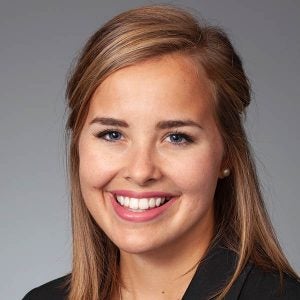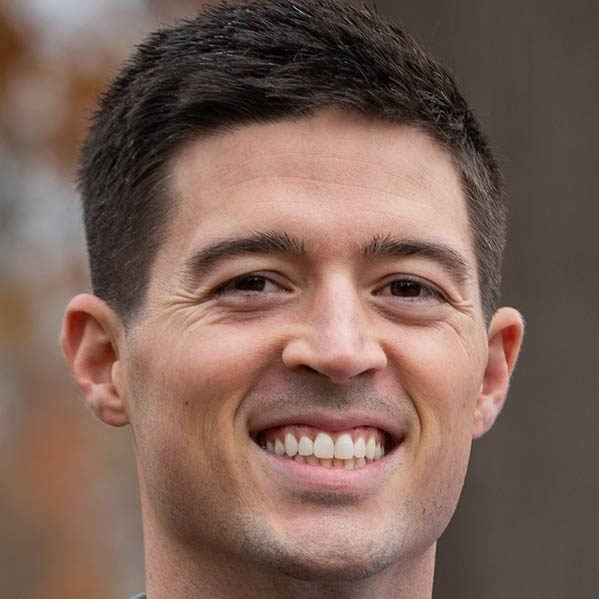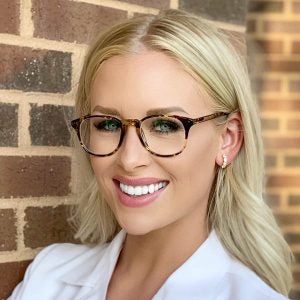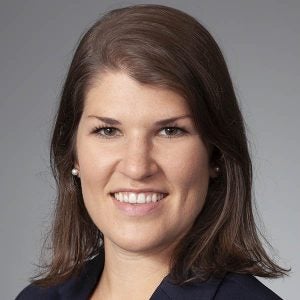ECU dental Schweitzer Fellows address needs in oral health care
As they overcame challenges presented by the pandemic, the School of Dental Medicine’s 2020-21 cohort of North Carolina Schweitzer Fellows made significant progress in addressing oral and overall health challenges in patients and communities during the past year.

Victoria Long Brotzman
Bradley Wilson Schweitzer Fellows Victoria Long Brotzman, Josh Stewart, Rachel Cantrell and Ashley Huff completed projects through the program, which guides students as they develop and implement service projects that address the root causes of health disparities in under-resourced communities, while also fulfilling their academic responsibilities.
Each project is implemented in collaboration with a community-based health and/or social service organization. The N.C. Schweitzer Fellows lead a multitude of service initiatives including care for the homeless, low-income new mothers, those who are food insecure, cancer patients, people struggling with chronic health conditions and more.
“I’d like to thank our students and Fellows for devoting time and energy for Schweitzer projects,” said Dr. Amna Hasan, director of interprofessional education, clinical assistant professor in the school’s Department of Surgical Sciences and coordinator of the school’s Schweitzer Fellows program. “It is very exciting to see them come up with new and innovative ideas which address health issues that impact our community. The Schweitzer Fellowship is competitive and prestigious, and these projects also align with the mission for our school.”

Joshua Stewart
The projects include various angles that add to student understanding, including patient care, community service, health disparities, patient and provider challenges and research. The experience gives students a new perspective on the school’s mission to serve those in rural and underserved communities and open doors to access to care.
Brotzman and Stewart accelerated the dental clearance process so patients can begin cancer treatment earlier. Before cancer patients can begin chemotherapy or radiation treatment, they need a dental evaluation and removal of both existing and potential oral infection to avoid complication.
The team also provided patient education to improve oral hygiene during cancer treatment and led student and provider education sessions to improve the delivery of medical and dental care to these patients.
“This project has brought new challenges of patient care, but ones that have made me the best provider,” Brotzman said. “Advocacy for our patients this year was critical for the success of the project which directly relates to the importance of interprofessional health care. Interprofessional health care and particularly communication between oral medicine, oral surgery, oncology and ENT was critical for the improvement of our patients.”
Brotzman and Stewart worked under the mentorship of Dr. Stevan Thompson, clinical associate

Rachel Cantrell
professor and division director of oral-maxillofacial surgery, and Dr. Iquebal Hasan, clinical assistant professor of oral medicine and director of the Emergency Care Clinic.
According to N.C. Schweitzer Fellows statistics, 22 patients were seen for diagnosing the need for clearance for cancer treatment. Twenty of those patients were seen for the actual clearance, and 12 of them expressed new confidence in their oral health. The team also implemented a process to track and follow up with patients post-treatment and worked to establish approval for dental clearance education as part of the Oral Medicine Course and Clinic Orientation for second-year dental students.
“This experience has sharpened my leadership skills, nourished my professional development and inspired me to pursue a residency program to specialize in a very specific field where I can continue to serve patients suffering from oral pathology,” Stewart said. “Most of all, however, working with our patient population has given me a heart to serve.”
Cantrell and Huff worked under the mentorship of Dr. Iquebal Hasan and Dr. Ramiro Murata, assistant professor in foundational sciences. The team educated women about the signs and symptoms of autoimmune diseases to help facilitate a diagnosis so they can begin treatment and

Ashley Huff
have a more active role in their health care. Fellows assisted with assessment and diagnostic testing. Referrals to a rheumatologist were made once the diagnosis was clear.
During the project’s duration, 30 patients were seen for an initial consult, and 27 of those were seen for follow-up visits. Twenty patients reported improvements in systems including an increase in salivary flow from baseline and a decrease in fungal infection, if tested positive. Seven patients received referrals to a rheumatologist. The team also developed a patient education video and brochures.
“I’ve learned that the patients will tell you exactly what is happening, lead you into their diagnosis — if you just listen to them,” Cantrell said. “Many patients don’t get to have ears that sit and soak up everything they say. Just giving them that makes them feel trust and openness. When they know we are truly there to help, it is all worth it.”
Huff said the experience studying autoimmune conditions means better care for her future patients.
“Research on many autoimmune conditions is relatively new so many health care providers may overlook or not consider certain signs and symptoms,” she said. “Learning more about autoimmune diseases with this project will help me be a better clinician and an advocate for awareness.”
Schweitzer Fellowships have an intensive leadership component so Fellows can inspire others to improve the health of those who experience barriers to care. Fellows work under the close guidance of community and academic mentors during their fellowship year. The class of 25 graduate students will spend the next year learning to effectively address the social factors that impact health and developing lifelong leadership skills, following the example set by famed physician-humanitarian Albert Schweitzer, for whom the fellowship is named.
The N.C. Fellows joined approximately 250 other 2020-21 Schweitzer Fellows working at program sites across the country: Alabama, Chicago, Columbus-Athens, Ohio; Dallas-Fort Worth; Detroit; Houston; Los Angeles; New Orleans; New Hampshire/Vermont; Pittsburgh; San Francisco and Tulsa. Upon completion of their fellowship year, the Fellows become Schweitzer Fellows for Life and join a vibrant network of more than 3,600 Schweitzer alumni who are skilled in, and committed to, addressing the health needs of underserved people throughout their careers.
The N.C. Schweitzer Fellowship is funded through the generosity of Blue Cross and Blue Shield of North Carolina Foundation, Duke University School of Medicine, ECU Brody School of Medicine, North Carolina Central University School of Graduate Studies, Vidant Health, University of North Carolina School of Medicine, Wake Forest University Health Sciences and individual donors.